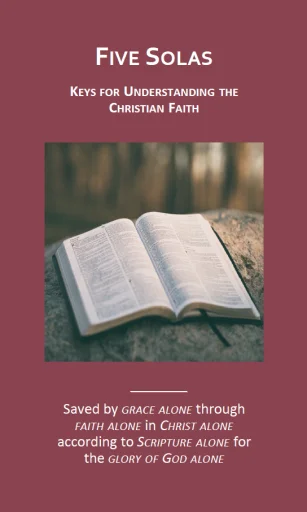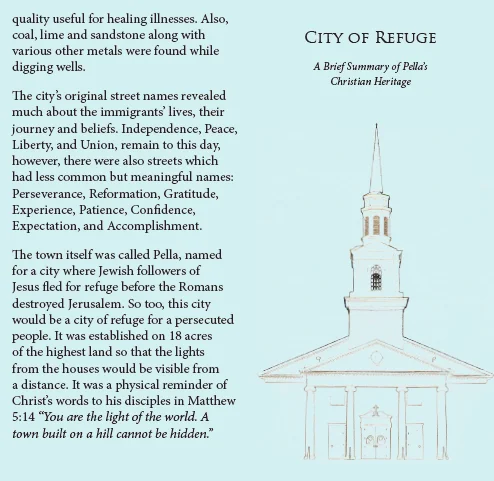Sharing the gospel in Pella, during Pella Tulip Time Festival, is a great pleasure for me as a Christian. It is a festival devoted not only to the wonderful beauty of God’s Creation in the tulips at the festival, but also to the Christian history and foundation built by the early settlers in Pella.
Sitting in the post office in downtown Pella is a mural on the wall, painted by Byron Bennet Boyd, depicting in three scenes of the settlers from Holland. First, the emigrants in Holland being arrested because of religious dissension. Second, they are being led in prayer by Dominie (title for the pastor in Dutch) Hendrik Scholte as they travel by ship to America. In the last scene, they are settled in Pella with the church as a center of the community.
I’d like to share a few observations about these settlers from Holland who founded Pella, IA.
They faced persecution: In Holland, Scholte was a leader in the group of Seceders from the state church. Because they did not go along with the changes in the church, the laws of the state progressively made it harder for them to gather together as a church for fellowship or for worship. Those outside the state church were not allowed to gather in groups larger than 19 people. Scholte’s congregation was over 300 people. This forced him and others to hold several, separate gatherings through the week to worship and minister to the needs of the congregation. Often pastors and members were arrested or harassed in their homes where they gathered. Rocks were thrown at them during their worship. “Congregations often held collections specifically to pay their minister’s fines, incurred for illegal preaching activities.” They came to America to re-gain their religious freedom.
They held their faith and scripture with conviction: These Christians held strongly to what scripture taught. They resisted the state church and eventually left because the state church accepted the ideals put forth by leaders of the enlightenment. These ideals included a “civil religion” with little theology. Many in the state church sought restoration and the rejection of these ideas. Hendrik Scholte was one of the leaders who in 1834, wrote the Act of Secession and departed. These Seceders held to “the moral supremacy of childbirth within wedlock and the right to raise children in the teachings of the church.” The persecution they faced because of their religious conviction led many of the emigrants to highly value their religious freedom. “For many emigrants, religious identity was linked to national identity. The migration showed, however, that religious identity superseded national identity.” They emphasized biblical study and personal knowledge of the faith.
The emigrants were not all Seceders but were all Christian: In 1846 Hendrik Scholte formed an emigration society to plan for their emigration out of Holland and to settle in America. Despite being a leader of the Seceders, he opened the invitation for the emigration society beyond just the Seceders. They gathered over 800 Protestant Christians, both rich and poor alike, to join together to establish a “Hollandsche Vrije Colonie” (Free Dutch Colony) in America. “Scholte called on the rich to aid the poor as a Christian duty and to therefore contribute to the migration funds.” In 1847, they set sail on 4 ships and arrived in America, not knowing exactly where they would settle. These Dutch Americans did not seek to reproduce Dutch society, but to reproduce the religious atmosphere of Protestant communities in the Netherlands.
They found freedom and refuge in America: After they arrived in New York, Scholte was able to preach in Dutch to many of the residents, a striking difference to Holland, where he had been banned from preaching in the churches. Scholte wrote in a letter home, “It was a unique experience to find myself in a hotel where strong drink was never sold, and where also a great number of the guests finished the day listening together to God’s Word, praising the Lord with enthusiastic song and thanking God on their knees for all his blessings, humbly confessing their sins and beseeching that their sins be forgiven and cleansed in the beloved blood of Christ.” As they sought out land, they saw God’s providence as Scholte met a Baptist minister at a funeral he attended and agreed to act as a guide for them. They found land in Iowa that was already owned by settlers. They met with each one to make agreements and purchase the land.
They established a settlement and named it Pella, after a city where Jewish followers of Jesus fled for refuge before the Romans destroyed Jerusalem. The city’s original street names revealed much about the immigrants’ lives; their journey and beliefs. Independence, Peace, Liberty, and Union, remain to this day, however, there were also streets which had less common but meaningful names: Perseverance, Reformation, Gratitude, Experience, Patience, Confidence, Expectation, and Accomplishment. Matthew 5:14 “You are the light of the world. A town built on a hill cannot be hidden.” They saw Pella as their city of refuge from the persecution they experienced in Holland.
Religion was the “glue” which held Dutch Americans together.
Additional Learning
Many of the quotes and history came from this paper
Prayer
Pray that you and other volunteers find and experience the refuge and rest in Christ. Pray that the lost will experience freedom found only in Him.
 Do I have to be an extrovert to share the gospel?
Do I have to be an extrovert to share the gospel?
 How Do I Proclaim the Gospel Boldly, but with Gentleness and Respect?
How Do I Proclaim the Gospel Boldly, but with Gentleness and Respect?
 Five Solas Business Card
Five Solas Business Card
 City of Refuge Pamphlet
City of Refuge Pamphlet